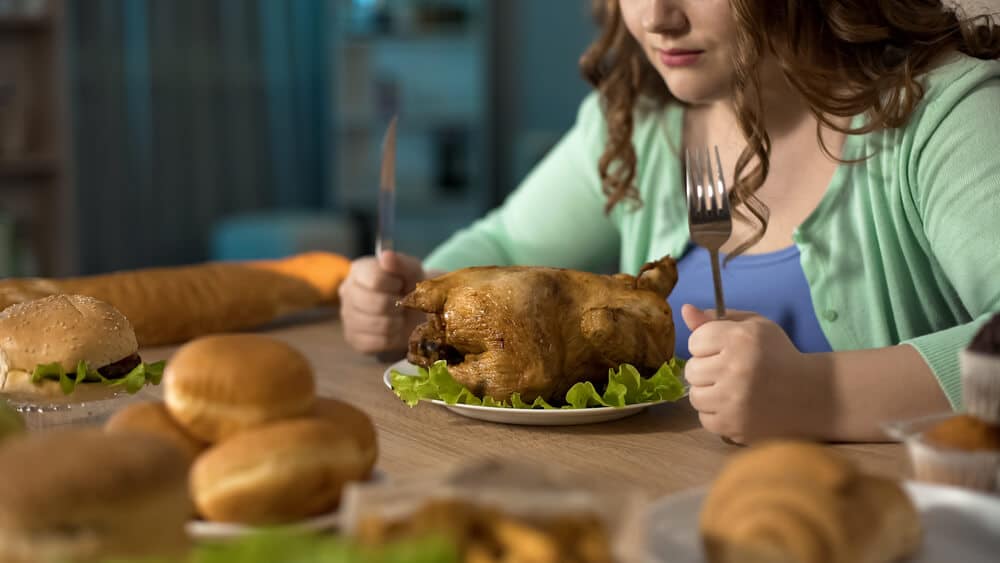8 Simple But Effective Ways to Stop Stress Eating
This entry was posted on October 2, 2020.

The most common stressors for Americans are money, worrying about the future of the nation, work, current political climate, and violence or crime.
The most common symptoms are anxiety, anger, and fatigue while stress eating is but one of the outcomes of this trigger for emotional eaters.
What is it about food that seems so welcoming when people are stressed and how can you stop stress eating and the uncomfortable emotions like regret, shame, and guilt that come along with it?
The Likely Culprit: Emotional Eating
Emotional eating hits when you’re at your weakest point which makes you crave intolerantly for food.
It can eventually sabotage your efforts in achieving your fitness goals. No matter how detrimental it can be to your physical and mental health, it doesn’t mean that you can’t stop it.
As crucial as making the decision to stop stress eating, is the science behind why you eat in response to negative emotions.
What Happens to Your Body During Stress Eating
When you are stressed, your adrenaline glands release cortisol, a hormone that increases your appetite and boosts your motivation to eat.
When you choose to eat food high in fat, sugar, or both, your insulin level increases.
When both cortisol and insulin are increased, stress-related responses and emotions are somehow dampened.
This is the reason why fat- and sugar-filled foods are called “comfort” foods because they seem to counteract stress.
Stress eating disorder is almost common among people, especially individuals whose work involves dealing with customers, calls, and extended hours.
How to Stop Emotional Eating
Take control of your appetite even when stress takes its toll on you.
You can get back on your workout routine or fitness goals when you start on taking these steps to stop stress eating:
- Identify what, how much, when, and how you eat
Get a journal and write it down. You may see a pattern on the relationship between the circumstances and the feelings you have when you eat.You can gain useful insight into your eating habits including:- Patterns of your hunger level, maybe on a 1-10 scale
- What you are doing before you choose to stress-eat
- What you are feeling that makes you stress-eat
- Deal with your stress
There’s a wide array of stress management techniques that you can do to counter stress like meditation, exercise, social support, and deep breathing, among others.Exercise causes chemical changes in the brain that reduce stress.If your personal circumstance makes it difficult for you to do exercises at the gym or at home, increase the amount of walking, gardening, cleaning, and other forms of movement that you do every day. - Do a hunger reality check
It might just be a craving so let it pass. Eat only when your stomach rumbles because you haven’t eaten for several hours.
- Get support or reach out for help
Lean on to your family and friends. Talk out your feelings and your unhealthy responses to stress with them. You may consider joining a support group or to speak with a professional counselor if you often feel guilt, shame, or regret over your eating habits. - Know your stressors
Identify what triggers your stress eating and once you recognize them, take steps to avoid them or at least be prepared to deal with them. - Take away temptation
Don’t fill your shelves with hard-to-resist comfort foods. If you identify a stressor and you feel like grabbing an unhealthy comfort food, postpone your trip to the grocery store until you have settled your emotions. - Practice mindfulness
Mindfulness keeps you calm and focused and helps you make smarter and healthier lifestyle choices, especially when you are attacked by comfort foods.
It strengthens mindful eating, one of its forms, where you slow down and pay more attention to what and how you eat. - Learn and Develop Intuitive Eating
Intuitive eating complements mindful eating; a practice developed by dietitians Evelyn Tribole and Else Resch. It’s about paying more attention to your natural eating cues so that your decision is based on hunger and not on how stressed or emotional you feel.
Prevent Stress Eating by Strategizing Your Goals
When you are mindful and recognize the triggers and situations that make you binge on food, you can take the step to stop stress eating.
Learn to cope with your emotions using the tips shared in this article to counteract your stress triggers.
Remember that you are not alone in this dilemma. Stress eating is a common experience but you can be different by doing what you learned to stop it.
More from Fitness Expo
Time-Saving Exercise when You Work from Home
How to Build Your Own Workout Routine





